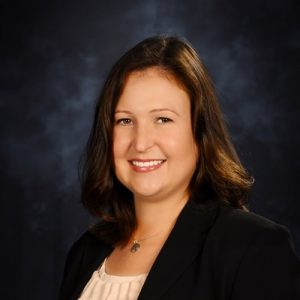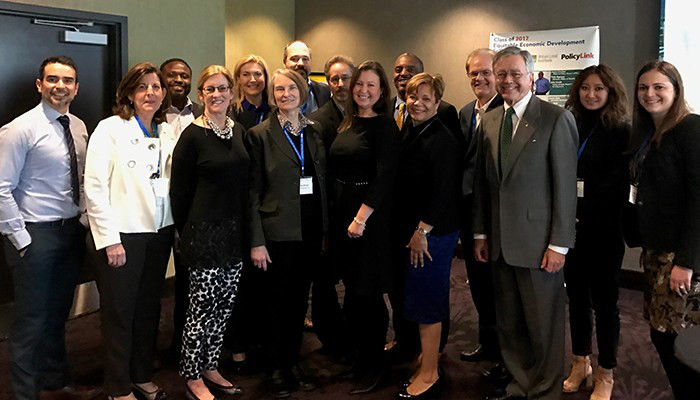An Inside Look at Equitable Economic Development in Charlotte
This post is part of a series on NLC’s Equitable Economic Development (EED) Fellowship.
The participants in NLC’s Equitable Economic Development (EED) Fellowship are tackling unemployment, low income levels, and workforce-related issues in their communities. This week I had the opportunity to speak with one of this year’s fellows, Holly Eskridge, who manages entrepreneurship and small business development for the city of Charlotte.
Carlos Delgado: Hi Holly, thank you so much for the time today. To start off, can you tell us a little about your background?
Holly Eskridge: I currently serve as Charlotte’s entrepreneurship and small business development manager. In this role, I lead a

Holly Eskridge serves as the city of Charlotte’s entrepreneurship and small business development manager. In this role, she leads a team that executes policy and programs directly supporting startups, small businesses and high growth entrepreneurial firms.
team that executes policy and programs directly supporting startups, small businesses and high growth entrepreneurial firms. I also provide project management support on large-scale city projects in the organization’s smart cities and transportation programs that impact distressed corridors in the city.
CD: And previous to this role? I heard you have some political staff experience? How about your academic background?
HE: Yes, previously I served as an assistant to the mayor of Charlotte and the intergovernmental affairs director in the city of Rock Hill, South Carolina. I hold a Bachelor of Social Work from the University of North Carolina at Charlotte and two masters in community and organizational social work and in public administration from the University of South Carolina. On a personal note, I am a huge football fan and have an annual tradition of attending at least one game per year in a previously unexplored stadium.
CD: That’s great! Let’s talk more about your city’s project – could you tell us why an equitable economic development agenda is a priority for Charlotte?
HE: Charlotte’s population is rapidly growing and is the nation’s seventeenth largest city with a population of over 850,000. Our healthy economy, access to highly-regarded educational opportunities, proximity to the Charlotte Douglas Airport (the 6th busiest airport in the world) and numerous quality of life attributes for all ages make it an attractive destination for newcomers and a place that native Charlotteans feel proud to call home.
In spite of the positive quality of life elements and strong economic trends, Charlotte is a city with residents and struggling small businesses that are not participants in nor beneficiaries of the city’s robust growth. There is a growing economic mobility gap in which various segments of the population are separated along racial lines, by income, family structure, educational level and geography. A 2015 Harvard University Study ranked Charlotte as 50th among 50 American cities in terms of the ability of a person in a lower income level to ascend to higher income levels during the course of his or her lifetime.
This reinforces why equitable economic development is the only responsible way to do our work. It ensures the city of Charlotte and its community partners are actively engaged in being part of the solution to address the mobility challenges many of our residents are facing. This is a critical part of accountability as a public servant.
CD: Thank you, that’s helpful framing. As you pointed out during our visit last year, your team is addressing the economic mobility gap with a set of tactical programs and larger-scale economic development policy reforms focused on small business and entrepreneurship, workforce development, and business incentives. What progress have you made since last June when the EED Fellowship kicked off?
HE: Included in our equitable economic development work are interventions that drive both short- and long-term change that build capacity and connectivity to job and business development opportunities for job seekers, small businesses and entrepreneurs in order to narrow the economic mobility gap between businesses and job seekers. Through the support of your organization’s leadership and collaboration with our community partners, we have seen significant accomplishments since June 2016.
When in comes to small business capacity-building, we started by organizing a small business stakeholder group that included business owners, BAC members, Business Resource Providers and government officials. We also established focus groups and conducted a survey of over 200 small businesses, which is currently under analysis and will be used to strengthen capacity-building efforts. In an effort to make resources and tools more accessible to small businesses, we redesigned the city’s business resource website with an interactive search tool, greater emphasis on storytelling around small business success, and an easy-to-navigate home page based on industry best practices.
On the workforce development front, we launched a new training program for adults with multiple barriers to employment called Partnership for Inclusive Employment and Career Excellence (Project PIECE) in partnership with Goodwill Industries of the Southern Piedmont and Urban League of the Central Carolinas. To get Project PIECE off the ground, corporate advisory councils convened and provided advice on curriculum design and we held several community outreach sessions for applicants. We now have approximately 200 community contacts contributing to the project, and have had 46 individuals enroll to-date. Some of our first training opportunities include trainings for careers in broadband and fiber optics, residential and commercial construction, and highway construction.
The city has also focused on increasing the availability of youth talent development programming – for example, we’ve had nearly 1,000 students from 19 high schools complete job readiness training, nearly 500 youth participate in interviewing skills training since July 2016, and received a $50,000 grant commitment from Microsoft for technology training.
And finally, policy considerations around business investment grants and business corridor revitalization have been presented to the City Council Economic Development (ED) Committee. Full city council consideration is pending.
CD: Could you expand a little more on the partnerships you have created with different stakeholders to successfully achieve your EED project outcomes?
HE: At the core of Charlotte’s success is our focus on partnerships and collaborative spirit. We approached our EED work by convening three partner groups with expertise in each element of our project scope (small business, talent development and business incentives and corridor revitalization). Each partnership team has a role in the EED work and collaboration is centered on the four Cs of commitment, compassion, collaboration and communication. Each partner has a role in the implementation of the EED Fellowship work program. These alliances are successful because they rely on the principle that the work involved in maintaining a partnership, and the benefits from the collaboration are spread equally among the organizations involved.
CD: Looks like you are doing a lot of progress and we at NLC, ULI, and PolicyLink feel extremely happy to be contributing to Charlotte’s success and progress. So far you have been the only EED Fellow to experience both peer-to-peer exchange opportunities, i.e. as a visiting EED Fellow to Houston and as an EED Hosting City Fellow during the technical assistance visit to Charlotte few weeks ago. Can you tell us about both experiences and what kind of advice did the group of visiting experts and visiting peer fellows gave to Charlotte?
HE: As a visiting EED Fellow, I was humbled to be engaged with the expert panel that provided recommendations to Houston EED project. NLC did an excellent job ensuring the visiting panel was one that both met their project scope and included professionals from both the public and private sector. The ability to learn from peers with such a wealth of knowledge was not limited to just the City of Houston. I felt like a sponge soaking up the intellect and wisdom of the other visiting fellows and I developed some string professional relationships in the process as well. This experience reinforced the need to prioritize the time to expand my professional networks.
On the hosting side, having visiting EED fellows and experts in Charlotte and gaining their insight in our work was a critical step in taking our community’s work to the next level. The attention the visiting panel paid to the experiences and ideas of our partner teams was genuine and gave tremendous credibility to the Equitable Economic Development initiative. Partners on multiple occasions have commented on the impact actively being part of the experience has had within their own organizations. The talent that was brought to Charlotte for those three days provided our community with thoughtful, realistic recommendations that are grounded in the core values of the city of Charlotte and its partners. The impact of this visit and our engagement in the EED Fellowship will last for many years to come.
CD: Before we conclude this very engaging conversation, I want to ask you one more question. In your opinion, what role is the EED Fellowship playing in your professional development??
HE: The professional development I have experienced as an EED Fellowship has been tremendous. First and foremost, how my team and I do our work has been transformed through the lens of equitable economic development. This intentionality in how we do our work I believe has led to significant accomplishments in our goal of increasing economic opportunity for all Charlotteans as well as strengthen the partnerships we have with community stakeholders. Having the opportunity to reframe how I do my work with the support of the resources and my peers from across the country has made me a more effective, accountable economic development professional.

EED Fellowship team during their visit to Charlotte.
Charlotte is one of six cities participating in this year’s EED fellowship. Later this month, we’ll share stories and experiences from other fellows.



